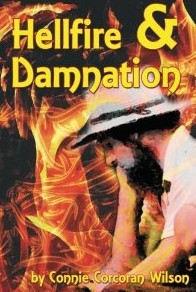 By CONNIE CONCORAN WILSON (Sam’s Dot Press; 2009)
By CONNIE CONCORAN WILSON (Sam’s Dot Press; 2009)
In horror fiction, as in most any other sort, true originality is an increasingly rare commodity. But it does exist, as proven by Connie Wilson’s HELLFIRE AND DAMNATION, an anthology that is genuinely, blazingly original.
The collection is rigorously structured around the nine circles of Hell as laid out in Dante’s INFERNO, yet the contents couldn’t be more varied in subject matter. What unites them is the unerringly rational, straightforward prose, which is unlike anything else in horror fiction (usually typified by subjective “you-are-there” descriptions). Stylistically it’s not unlike Wilson’s previous book GHOSTLY TALES OF ROUTE 66, a journalistic compendium of American folklore that was likewise distinguished by its novelty. HELLFIRE AND DAMNATION, however, far outpaces the earlier volume in every respect.
“Hotter Than Hell,” categorized under the Gates of Hell, starts things off. Inspired by the final words of real death row inmates, it’s a gritty and depressing account of prison life.
From there we move into the first circle of Hell, where Pagan souls reside. Illustrating this is “Rachel and David,” set in Webster Groves, Missouri, and apparently based on folklore from that region. It’s about a young couple and their fateful meeting with two odd kids.
In Circle Two, Lust, we have three stories. The first, “Love Never Dies,” is a strange little number set in ancient Rome and headlined by an undead prostitute! “Konerak” takes a real-life incident, of the man who almost escaped the clutches of the late Jeffrey Dahmer, and spins a wild tale of Oriental sorcery emerging from the Hmong of Laos, who fought for the United States against the Viet Cong (obviously this is the only place you’ll find Eastern mysticism, Jeffrey Dahmer and the Vietnam War combined). “Effie, We hardly Knew Ye!” is another folklore-based tale, this one of an Oklahoma City hotel haunted by the spirit of its founder’s wronged mistress.
Circle Three is Gluttony, as represented by “Amazing Andy, the Wonder Chicken.” In this tale a chicken gets its head cut off and still lives—and I’ll leave you to discover the rest of it on your own.
From there it’s on to the circle of Hoarders and Wasters, with “The Lemp Mansion Curse,” a jaunty account of a family curse, and “Queen Bee,” about an all-too appropriate revenge taken on a woman whose personality and social standing are accurately encompassed by the title.
Circle Five is the Wrathful. It contains “The Ghost Girl of Howard “Pappy” Litch Park,” set along the author’s favorite highway, Route 66. Here, in what may or may not be a fact-based tale, a father’s wrath causes his young daughter to be whisked away…but glimpses of the girl can of course still be seen in the area.
Heretics populate the Sixth Circle, containing the quietly unnerving “Hell to Pay.” It combines a look into Amish life with an intriguing speculation on the origins of schizophrenia and multiple sclerosis. Also in the Heretics circle is “On Eagles’ Wings,” concerning a weird cultist, a young girl and an unhealthy obsession with birds.
Circle Number Seven is reserved for The Violent. It begins with “Going Through Hell,” about a serial killer and his woman police officer victim, and continues with “Living in Hell,” about a young boy who visualizes a serial killer’s crimes in nightmares. This tale is particularly shivery: the concept isn’t terribly original, but the nasty subject matter and clinical prose make for a skin-crawling read.
Circle Eight consists of The Fraudulent, represented by “Confessions of an Apotemnophile.” That word refers to an person desiring to amputate his own limbs, in this case a man who’s harbored an all-consuming desire to lose his legs ever since conversing with a like-minded individual as a child.
Circle Nine is the final circle, featuring “An American Girl,” the collection’s creepiest story. Its subject is the factual murder of a teenage girl in snowy Illinois, with the bulk of the tale taken up with a methodical depiction of the pubescent killers’ attempts at disposing of the corpse.
You won’t find another collection like this one. Some readers, I’m sure, will be put off by its oddness, yet it fulfills most every expectation one might have for a horror anthology, being readable, entertaining and deeply unsettling in a manner unique to itself.
